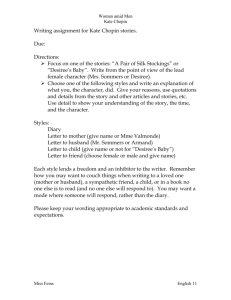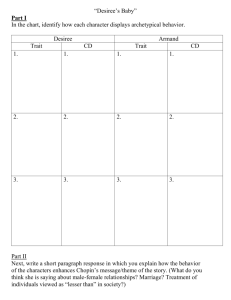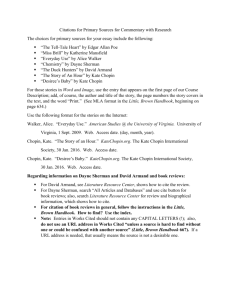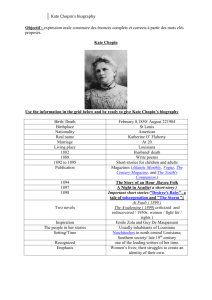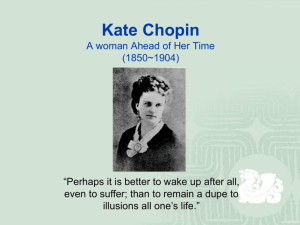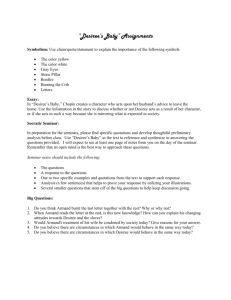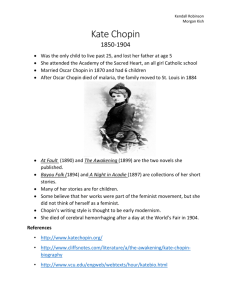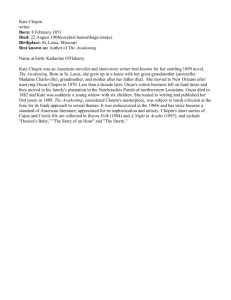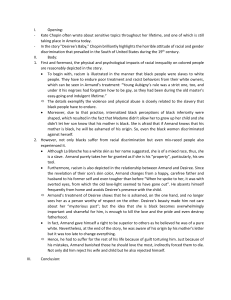Lord review 83
advertisement
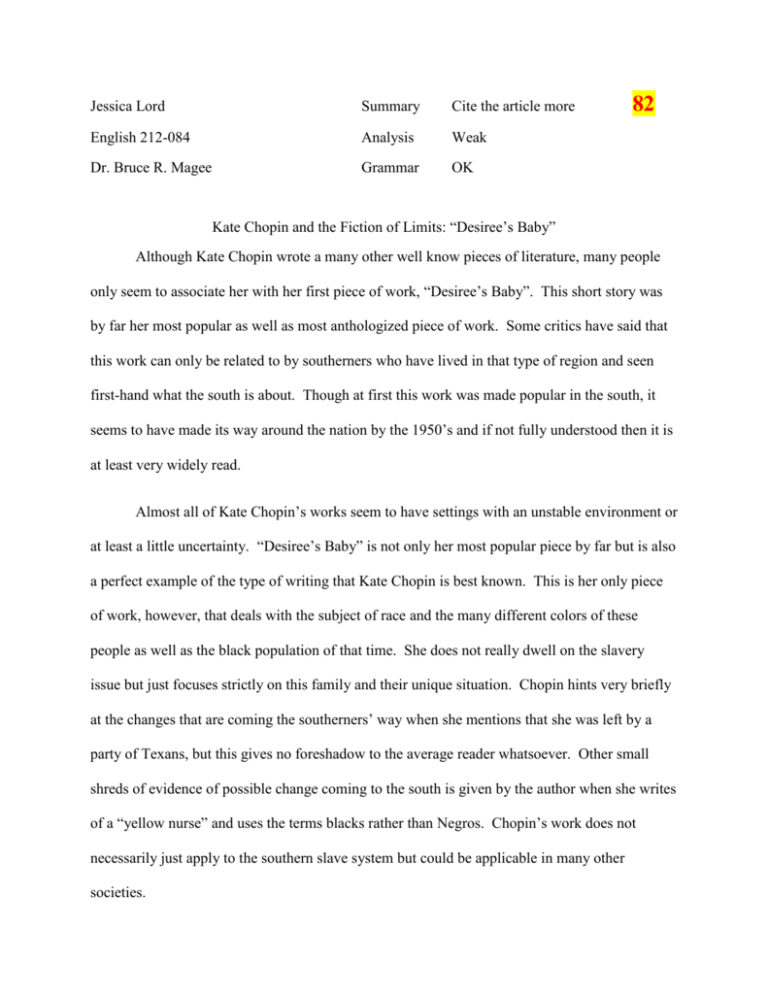
Jessica Lord Summary Cite the article more English 212-084 Analysis Weak Dr. Bruce R. Magee Grammar OK 82 Kate Chopin and the Fiction of Limits: “Desiree’s Baby” Although Kate Chopin wrote a many other well know pieces of literature, many people only seem to associate her with her first piece of work, “Desiree’s Baby”. This short story was by far her most popular as well as most anthologized piece of work. Some critics have said that this work can only be related to by southerners who have lived in that type of region and seen first-hand what the south is about. Though at first this work was made popular in the south, it seems to have made its way around the nation by the 1950’s and if not fully understood then it is at least very widely read. Almost all of Kate Chopin’s works seem to have settings with an unstable environment or at least a little uncertainty. “Desiree’s Baby” is not only her most popular piece by far but is also a perfect example of the type of writing that Kate Chopin is best known. This is her only piece of work, however, that deals with the subject of race and the many different colors of these people as well as the black population of that time. She does not really dwell on the slavery issue but just focuses strictly on this family and their unique situation. Chopin hints very briefly at the changes that are coming the southerners’ way when she mentions that she was left by a party of Texans, but this gives no foreshadow to the average reader whatsoever. Other small shreds of evidence of possible change coming to the south is given by the author when she writes of a “yellow nurse” and uses the terms blacks rather than Negros. Chopin’s work does not necessarily just apply to the southern slave system but could be applicable in many other societies. Armand fell in love with Desiree very quickly and their love it seems cannot be separated. Desiree may not have fallen in love so quickly but she depends on Armand as her husband and as head of the household. It seems as if Armand is mentally torturing himself with his eternal struggles. Desiree seems to love Armand regardless of how he treats her or how well or poorly he treats the slaves. She will stay with him as long as he continues to show affection for their baby. Since her first piece of work Chopin has always seemed to idealize around the changing of the south and written much about life on the plantations. Her writing on the subjects has improved with every piece of fiction written. Later in her career Chopin distanced herself from this writing and wrote of more traditional topics. I personally loved this short piece of fiction and thought it to be a great story not only in that southern setting all those years ago but also for today’s reader. I could see the story applying to any society around this world and giving the reader almost the same shock in the end as one might have had when reading it many years ago. The first time I read this work the ending surprised me. Desiree never actually knowing her biological parents definitely helped me to form an early opinion regarding how the story would end. When I read it a second time I saw very small hints of the possible “surprise” ending. This work of hers has encouraged me to want to read more of her literature. To me, Armand can be seen as a villain who in the end got what he deserved for his treatment of the slaves. He could also be seen as a hero for loving his child and for changing the way he treated his slaves. I would imagine that while not a controversial piece of work today, that it could have drawn much attention with its publication in the 1950’s. I would not be surprised to hear of some type of opposition against Kate Chopin upon release of this work of fiction. I cannot help but wonder where Chopin learned so much about the southern slavery system and what made her write on this particular subject. I would like to think that she was raised as a free thinker and was a woman who studied the slavery system and was intrigued by it and wanted equality for everyone. This was the first of many works that I will read by Chopin as this piece of literature has left me hungry for more of her ideas. I only wish that she had not left the ending quite as open as she did. I would have loved to know what became of this family. I wonder if the couple survived this surprise long-term or if they eventually let their doubts or maybe the talk around the town get the best of their relationship. I would like to know if Armand continued to treat his slaves kinder and if he continued to love his son as he did when he was a newborn. Most of all though, I would really love to know what became of this baby as he went through childhood. I want to know how society treated him as a child and as a teen. I want to know what kind of man he eventually turned into and how he lived his life. Wolff, Cynthia Griffin. "Kate Chopin and the Fiction of Limits: ‘Desiree’s Baby’." The Southern Literary Journal 10.2 (1978): 123-33. JSTOR. Web. <http://www.jstor.org/stable/20077591>.
